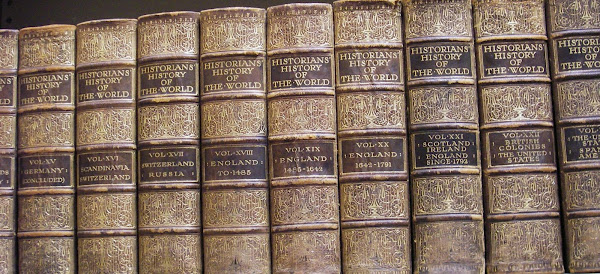Set in 50BC, these hysterical historical tales follow the adventures of Asterix in the days of the Roman Empire. Gaul is entirely occupied by the Romans except for one small village of indomitable Gauls who still hold out.

Asterix the hero of these adventures is a shrewd and cunning little warrior who gets his superhuman strength from a magic potion. Obelix is Asterix’s inseparable friend always ready to drop everything to go off on a new adventure so long as there’s wild boar to eat and plenty of fighting. Getafix is the venerable village druid who brews the magic potion, and finally there’s Vitalstatistix the chief of the tribe, brave and hot-tempered, who’s only fear is that he’s afraid the sky will fall on his head tomorrow. But as he says tomorrow never comes.
The true hero of these stories though is someone who normally gets little or no attention, it’s the translators Anthea Bell and Derek Hockridge. Rene Goscinny was French, so the word plays and puns were French. It was the role of Anthea and Derek to ensure that the topical, cultural and morphological humour and jokes were appreciated, from the simple knockabout jests for quite young children and some distinctly sophisticated humour that depended on literary or artistic allusion for the adult mind.
A recurring joke is the names of people and places: Roman names end with “US” like Centurion Stratocumulus or Encyclopedicus Britannicus, while Britons end with an “X” Anticlimax and Overoptimistix. Then there’s the Roman camps of Aquarium, Laudanum, Totorum and Compendium.
 Normally Asterix is concerned with protecting his Gaulish village from the legionaires (with the help of a magic potion), but in “Asterix in Britain”, we find the Britons were rather like the Gauls, they had the same language but with some peculiar expressions of their own. And in spite of their gallantry against the Roman invaders, their strange customs were rather a drawback in battle. They insisted on breaking off a 5 o’clock every day to drink hot water, and moreover they stopped fighting 2 days out of every 7. Accordingly Julius Caesar a cunning strategist, decided to fight only at 5 o’clock on weekdays and all day at the weekend, all of Britain was thus occupied.
Normally Asterix is concerned with protecting his Gaulish village from the legionaires (with the help of a magic potion), but in “Asterix in Britain”, we find the Britons were rather like the Gauls, they had the same language but with some peculiar expressions of their own. And in spite of their gallantry against the Roman invaders, their strange customs were rather a drawback in battle. They insisted on breaking off a 5 o’clock every day to drink hot water, and moreover they stopped fighting 2 days out of every 7. Accordingly Julius Caesar a cunning strategist, decided to fight only at 5 o’clock on weekdays and all day at the weekend, all of Britain was thus occupied.Then there are the running gags, like the fog that rolls in at different times through the story, the need for a tunnel between Gaul and Britain so people could keep out of the rain and fog; the Britons covering all their food in mint sauce, British institutions: a double-decker chariot, a portable roof to stop the sky falling on their heads (read umbrella). The biggest running gag is the Britons stopping to drink hot water, with a little milk, from dainty cups and saucers. Asterix drops some herbs which he hopes will make magic potion, into the hot water cauldron. The brew gives the warriors courage and the Britons ask Asterix to send back more herbs and they’ll make it their national drink.
What makes these stories really special is that they rely so much on language the nuances, double meanings, etc. – a true feat.





No comments:
Post a Comment